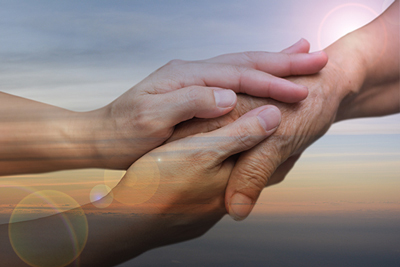Understanding Skirball Hospice: A Q&A with Los Angeles Jewish Health Chief Medical Officer Dr. Noah Marco


Understanding Skirball Hospice: A Q&A with Dr. Noah Marco

Among Los Angeles Jewish Health's many exceptional programs and services, Skirball Hospice stands out. Our skilled, compassionate end-of-life care provides patients and their families with critical support during one of life's most challenging times. We are proud to be a nurturing, collaborative partner in helping to meet their needs.
It can be confusing to understand the difference between hospice care and palliative care. Below, Los Angeles Jewish Health's chief medical officer, Noah Marco, MD, sheds light on what distinguishes each and offers an introduction to what makes Los Angeles Jewish Health the right choice for these services.
Question: What is hospice, and when should someone consider it?
Answer: Hospice services should be considered by an individual whose doctor believes his or her life expectancy may be less than six months. The decision to enroll in hospice is usually made when a life-limiting condition is believed to be advancing, when medical intervention has reached its maximum benefit, and when a patient or their representative decides to focus on maintaining comfort and symptom management at home rather than in a hospital setting. Hospice is a federal benefit that provides additional services not usually covered by other insurance plans.
Q: What is the difference between hospice and palliative care?
A: Palliative care helps optimize quality of life by anticipating (or preventing) any form of pain and suffering rather than treating an underlying disease. Qualifying individuals do not have to meet the strict criteria requirements of hospice to receive this care. The focus of palliative treatment is both on meeting the patients' physical needs with regard to symptom management and the psychological, spiritual, and social challenges diseases create. Many individuals start in palliative care until they meet the care criteria for hospice. Palliative care can be provided in a hospital, cancer center, nursing home, outpatient clinic, hospices, or in the patient's home.
Q: Where does Skirball Hospice care take place?
A: Hospice services are offered wherever the person is residing. Currently, 30% of Skirball Hospice patients are residents of Los Angeles Jewish Health, and 70% are community residents in the San Fernando Valley, West Los Angeles, and surrounding cities. The very first visit can even occur in the hospital. One of the advantages of Skirball Hospice is that our clinicians go to people's homes rather than requiring patients to find transportation to a clinic or doctor's office.
Q: What differentiates Skirball Hospice among other, similar hospice services?
A: Founded in 2002, Skirball Hospice is the only Jewish-sponsored nonprofit hospice in the greater Los Angeles area. It has a well-deserved reputation for high quality, caring service. Though our program has its roots in Jewish values, we proudly serve people of all faiths and backgrounds. We work with a variety of payors including Medicare, Medi-Cal, and most private insurances, and because we are a not-for-profit agency, no one is ever denied service because of inability to pay.
Q: What type of support does Skirball Hospice provide family members, both during hospice and after the passing of a loved one?
A: Whereas routine medical care can often focus on the individual patient, providing little or no support to family and friends who may also be impacted by the burdens of disease, the dedicated staff members at Skirball Hospice offer families compassionate assistance from the very first contact. Our response team is available to meet in the home or at a hospital or care facility. Our bereavement staff is trained and experienced in the areas of counseling, chaplaincy, spirituality, end-of-life, grief, and loss. Bereavement support at Skirball Hospice includes ongoing planned contact with the family through visits, telephone calls, letters, an annual memorial service, and referrals to community resources such as support groups. All participants in the bereavement program receive a comprehensive series of mailings on a monthly basis to help reflect on their loss and assist with the grief and recovery process. Our support continues for 13 months, covering an entire cycle of holidays, birthdays, and anniversaries and helping family members maintain or regain their level of well-being.
For more information, call Skirball Hospice at (877) 774-3040.